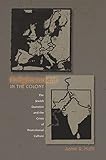Enlightenment in the Colony : The Jewish Question and the Crisis of Postcolonial Culture / Aamir R. Mufti.
Material type: TextPublisher: Princeton, NJ : Princeton University Press, [2009]Copyright date: ©2007Edition: Course BookDescription: 1 online resource (344 p.) : 1 line illusContent type:
TextPublisher: Princeton, NJ : Princeton University Press, [2009]Copyright date: ©2007Edition: Course BookDescription: 1 online resource (344 p.) : 1 line illusContent type: - 9780691057323
- 9781400827664
- 211/.60954 22
- online - DeGruyter
- Issued also in print.
| Item type | Current library | Call number | URL | Status | Notes | Barcode | |
|---|---|---|---|---|---|---|---|
 eBook
eBook
|
Biblioteca "Angelicum" Pont. Univ. S.Tommaso d'Aquino Nuvola online | online - DeGruyter (Browse shelf(Opens below)) | Online access | Not for loan (Accesso limitato) | Accesso per gli utenti autorizzati / Access for authorized users | (dgr)9781400827664 |
Frontmatter -- Contents -- A Note on Translation and Transliteration -- Acknowledgments -- Abbreviations -- Prologue. Towards a Genealogy of Postcolonial Secularism -- Part I. Emergence: Europe and Its Others -- Chapter One. Jewishness as Minority -- Chapter Two. Inscriptions of Minority in British Late Imperial Culture -- Part II. Displacements: On the Verge of India -- Chapter Three. Jawaharlal Nehru and Abul Kalam Azad -- Chapter Four. Saadat Hasan Manto -- Chapter Five. Faiz Ahmed Faiz -- Epilogue. In My Beginning Is My End -- Notes -- Works Cited -- Index
restricted access online access with authorization star
http://purl.org/coar/access_right/c_16ec
Enlightenment in the Colony opens up the history of the "Jewish question" for the first time to a broader discussion--one of the social exclusion of religious and cultural minorities in modern times, and in particular the crisis of Muslim identity in modern India. Aamir Mufti identifies the Hindu-Muslim conflict in India as a colonial variation of what he calls "the exemplary crisis of minority"--Jewishness in Europe. He shows how the emergence of this conflict in the late nineteenth century represented an early instance of the reinscription of the "Jewish question" in a non-Western society undergoing modernization under colonial rule. In so doing, he charts one particular route by which this European phenomenon linked to nation-states takes on a global significance. Mufti examines the literary dimensions of this crisis of identity through close readings of canonical texts of modern Western--mostly British-literature, as well as major works of modern Indian literature in Urdu and English. He argues that the one characteristic shared by all emerging national cultures since the nineteenth century is the minoritization of some social and cultural fragment of the population, and that national belonging and minority separatism go hand in hand with modernization. Enlightenment in the Colony calls for the adoption of secular, minority, and exilic perspectives in criticism and intellectual life as a means to critique the very forms of marginalization that give rise to the uniquely powerful minority voice in world literatures.
Issued also in print.
Mode of access: Internet via World Wide Web.
In English.
Description based on online resource; title from PDF title page (publisher's Web site, viewed 30. Aug 2021)


